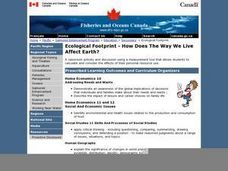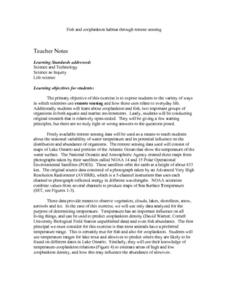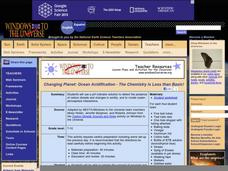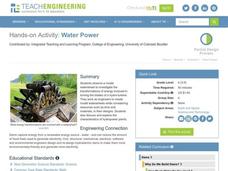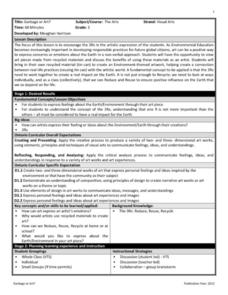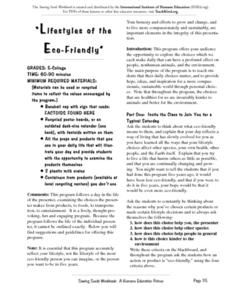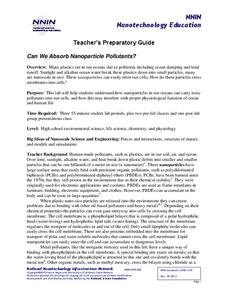Curated OER
Ecological Footprint--How Does The Way We Live Affect Earth?
Learners demonstrate an awareness of the global implications of decisions that individuals and families make about their needs and wants. They identify environmental and health issues related to the production and consumption of food....
Curated OER
Plankton in the Air
Here is a lab activity adequate for use with any full lesson on environmental factors that shape animal adaptations or marine animal characteristics. Pupils will discuss the role plankton plays in the environment and filter-feeding...
Curated OER
Poetry Through Digital Storytelling
Bring digital storytelling to your language arts class! To begin, learners select their own topic, such as a poem that reflects a life experience they had or a historical figure who interests them. Then they work to create a storyboard...
Curated OER
Fish and zooplankton habitat through remote sensing
Students are exposed to the variety of ways in which scientist use remote sensing and it used in everyday life. They investigate about zooplankton and fish. Students list the two important groups of organisms in both aquatic and marine...
Curated OER
The Birds of a Feather Flock Together
Fifth graders identify all parts of an egg, and explore their importance to the life cycle of a chicken. Learners compare all sorts of birds and place them in categories based on what they look like. This five-day lesson effectively...
Curated OER
Changing Planet: Ocean Acidification - the Chemistry is Less than Basic!
A video and laboratory investigation are highlights to this lesson on acidification of ocean water due to increased atmospheric carbon dioxide. Using bromothymol blue (BTB) as an indicator, pupils analyze the amount of carbon dioxide...
Teach Engineering
Water Power
Young hydrologists observe a waterwheel which helps them investigate the transformations of energy that occur when the blades of a hydro-turbine are turning. They work together in pairs and pretend to be engineers who are building a new...
Curated OER
Garbage or Art?
The three R's are, reduce, reuse, and recycle. Third graders use recycled materials to design and create an environmentally themed piece of art. They discuss and examine major art works that were created using recycled materials, then...
Cornell University
Bacteria Take Over and Down
Bacteria outnumber all other forms of life on Earth. Scholars observe the growth of bacteria in petri dishes to understand their role in maintaining good health. Then, they observe the growth of bacteria after they introduce...
Curated OER
Reptiles and Amphibians
Introduce your class to various reptiles and amphibians. They will meet and identify a representative from each of the four major reptile families, then learn about and discuss reptile characteristics. Next, they will identify and...
Curated OER
Blue Crabs - The Blue Crab's Chesapeake Journey
A plethora of information about the blue crabs of Chesapeake Bay will amaze and delight your marine biologists. They learn, through direct instruction, about the characteristics and life cycle of this fascinating arthropod. A highlight...
Curated OER
Stressed Out!
Have your class engage in lessons on earthquakes. Learners explore the science behind earthquakes using interactive websites and video clips. Then, they review the layers and parts of the Earth before delving into the causes of...
Curated OER
Bering Sea Buffet - A Foodweb Activity
Life in the Bering Sea, food webs, and the ocean ecosystem are introduced with a map activity. The lesson starts as kids explore maps and images of the Bering Sea, then it kicks into high gear as they start to discuss the types of...
Prince William Network
The Incredible Journey
Divide your school gym into breeding grounds and non-breeding grounds so that your zoologists can play a game simulating the seasonal migration of shorebirds. Players pick one of the included game cards and follow its directions, which...
Rainforest Alliance
How Do Jaguars and Howler Monkeys in Belize Depend on Us?
How does weather play a role in the lives of land and sea creatures? Find out with a instructional activity focused on habitats and the ways animals from different homes are connected. Here, learners explore how the life of a...
NOAA
Biological Oceanographic Investigations – Signals from the Deep
The Deepwater Horizon oil spill directly impacted an area of the Gulf of Mexico the size of Oklahoma. A marine biology lesson looks at the impact of an oil spill on the deeper parts of the ocean. Scholars download actual data collected...
Chicago Botanic Garden
Preparing for Project BudBurst
Male deer growing antlers to begin the breeding season is an example of a phenological event. First in a four-part series is an activity requiring individuals to collect phenological data on their campus. Classes discuss phenology, the...
Kenan Fellows
Terrarium in a Bottle: Modeling the Atmosphere, Greenhouse Effect, and Water Cycle
You've heard of farm to table ... but what about farm in classroom? Junior agriculturalists embark upon a two-week journey into the science of growing things. Based upon the classic terrarium in a two-liter experiment, the lesson goes...
Curated OER
Lifestyles of the Eco-Friendly
A helpful activity encourages pupils to make environmentally-friendly choices at home. The packet presents many ways that learners can help the environment, such as taking shorter showers in order to conserve water.
National Nanotechnology Infrastructure Network
Can We Absorb Nanoparticle Pollutants?
Just because we can't see it doesn't mean it isn't there! A growing concern for environmental scientists is toxic nanoparticles in our air and water. Young scholars conduct an experiment to demonstrate how these particles can cross our...
Curated OER
Bromine: An Important Arkansas Industry
Arkansas ranks first in the entire world in the production of bromine! Here is a lesson which guides middle schoolers through a study about the formation and history of Arkansas' bromine reserves. They also looks at the many uses of...
Curated OER
Earth Materials Module
This slide show progresses through a comprehensive review of the grounding principles of earth science. Get down and dirty with the details of fossil fuels! Help your geologists to have a rock solid understanding of the rock cycle. The...
National Nanotechnology Infrastructure Network
Biology Reference Sheet
First year life science or biology pupils will appreciate this all-inclusive reference page. It provides a diagram of both a plant and an animal cell, the metric system prefixes, classification levels, definitions for cell processes, the...
It's About Time
Diversity in Living Things
How diverse is the world we live in compared to the way things used to be? Young biologists explore diverse organisms and relate the structure of each organism to its ability to survive in our current environmental conditions....


